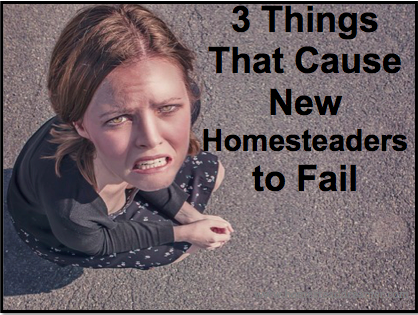New homesteaders are usually wide-eyed, passionate people who are gung-ho about getting their homestead up and running as fast as they possibly can. While there are good reasons to rush – weather, finances, family needs – there are many more reasons why it’s important to slow down. Way down. Almost to a stop. Now, look around and start thinking.
I don’t want to rain on anyone’s parade but, on the same token, I don’t want anyone to bring their own rainstorm, either. You have to clear the stars from your eyes to clearly see the incredible amount of planning and work you have ahead of you. It can be overwhelming and challenging, I know! We are right in the middle of trying to get our plans ironed out so we can move forward to being ready to move to a homestead when the time comes. There are three things that are sure to make you fail as a homesteader and it doesn’t have anything to do with being able to slaughter your own meat animals. Failure will come from a lack of planning in three areas:
- Failure to define. You want a homestead, that’s great! What kind of homestead? What do you want to get out of it? What is the purpose, other than living the ‘simple life?’ What kind of buildings will you need to make it all work together? Will you have livestock? CAN you have livestock in the place you want to live? Is it legal to hang dry your clothes? You need to know what you want, at least at first, before you start making the plan.
- Failure to have Plan B and C. There are those who’ve spent literally every penny to get their homestead and stuff moved to it but fail to have any sort of backup whatsoever. They are essentially flying by the seat of their pants and hoping nothing explodes in their face. This is the wrong way to go about things. You need to have contingency plans in place as best as you can. A place to go if things go awry, extra resources you can draw from in an emergency, help when you need it. No matter how well you plan, something will go wrong. That’s life!
- Failure to Prep. This ties in with having a Plan B and C in place. Things will go wrong, or at least not in the way you expected them to go. You have to be flexible and roll with the punches that comes into everyone’s lives, no matter what lifestyle they have. You also need to be realistic about your timeline. It’s highly unlikely that you will grow enough food your first year to actually carry you and your family through the entire winter. What about money (because you matter what, you will need some) for essentials you can’t produce yourself? Do you have some kind of income or savings that can handle the unforeseen emergencies and buy more fuel for the generator?
You have to be stubborn as a mule, flexible as a sapling, and strong as silk…
There is so much that goes into having a homestead and when you’re trying to set one up from scratch, it is overwhelming. You would be perfectly normal to have more than one time when you ask yourself, “Is this worth it? Do I really want to live like this?”
The small list above isn’t intended to be the ‘definitive list’ of why homesteads fail but I bet you can ask anyone who has gone through it and pinpoint one of the three that as the reason. Sure, Mother Nature may have been ‘responsible’ for the damage done to your home but it’s you who Failed to Have a Plan B. And don’t even get me started on the skills you need!
Even more important than all of the above is your attitude. You have to be stubborn as a mule, flexible as a sapling, and strong as silk to be able to have a solid chance at making it through the learning curve and growing pains of having a homestead. You absolutely must be flexible. You have to want it more than the challenges you will face. You have to be passionate and self driven! It isn’t always a glamorous life, but it’s an honest and fulfilling one!





The three “things” are basic to any situation. Lack of thought and preparing are enemies of success in any endeavor! Well stated for homesteading and being sustainable!
3 excellent tips! Planning and preparing are two good tips for just about anything you can think of. Work, school, life in general, right?
Oh yes. They could be applied to just about everything but when it comes to certain things, like changing your lifestyle, they are even more important!
I agree.
And if you have animals please have a fail plan for them … What will they eat when there is nothing to graze??? If you fail what happens to them? Do you know when to call it quits for the sake of the animals on your homestead??